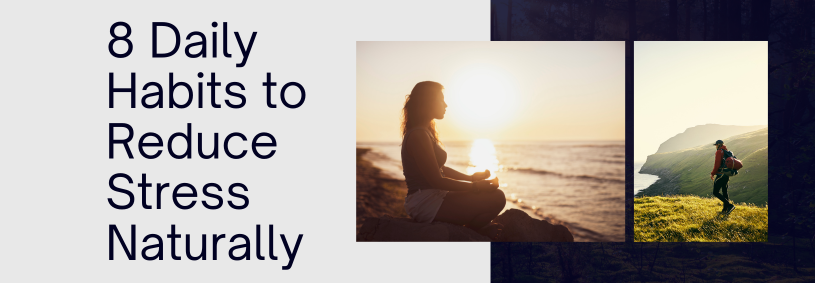From Surviving to Thriving: Natural Stress Relief with Theanine and More
- Blog
- From Surviving to Thriving: Natural Stress Relief with Theanine and More

Stress is a normal part of life—until it’s not. While the stress response evolved to protect us, chronic stress keeps us stuck in survival mode, slowly wearing down our bodies, minds, and spirits. As a naturopath with lived experience of trauma, burnout, and recovery, I understand stress not just clinically, but personally. That’s why I’m passionate about helping people rediscover calm through natural solutions—starting with awareness, then building daily practices that support the nervous system.
Understanding the Stress Response
As members of the animal kingdom, we’re wired to survive danger. When we experience a threat—real or perceived—our sympathetic nervous system kicks in. This “fight or flight” mode increases heart rate, redirects blood to the muscles, and slows digestion to help us escape or defend ourselves.
After the threat passes, the parasympathetic nervous system—our “rest and digest” mode—should step in to restore balance. Think of it like a parachute: it slows things down and helps us land safely.
But what if the stress never ends?
In today’s world, our nervous systems are constantly pinged by emails, financial worries, relationship tension, or information overload. When stress is chronic, the body struggles to switch off the alarm. This can lead to poor sleep, anxiety, hormonal imbalance, gut issues, fatigue, and even long-term illness.
Theanine: A Natural Ally for Calm and Focus
One of my favourite natural supports for the nervous system is theanine, an amino acid most commonly found in green tea. It’s known for its ability to boost alpha brain waves—these are the same calming, alert brain waves seen during meditation and deep creative thinking.
What makes theanine unique is that it promotes a sense of calm without causing drowsiness. It helps with focus, mental clarity, and emotional regulation—perfect for those experiencing “wired but tired” burnout or scattered thinking under pressure. Many of my clients find that theanine gives them just enough mental space to respond to stress more mindfully, rather than reacting automatically.

You don’t have to overhaul your entire life to feel better. Small, consistent changes make a big difference. Here are 8 powerful habits to support stress recovery:
- Breathe with intention
Start and end your day with three deep, slow breaths. This simple act signals your body that you’re safe. - Spend time in nature
A 20-minute walk in green space can significantly lower cortisol (your stress hormone) and boost mood. - Connect with others
Whether it’s friends, family, a therapist or support group, having someone to talk to is vital for healing. - Create digital boundaries
Limit screen time, especially in the evening. Reduce notifications and try checking emails only at set times to avoid mental overload. - Move your body regularly
Exercise helps regulate your nervous system and boosts feel-good endorphins—even a gentle walk or stretching counts. - Prioritise sleep
Reduce bright lights in the evening, avoid caffeine late in the day, and consider herbal teas like chamomile or tulsi to wind down. - Do what you love
Engage in hobbies like gardening, painting, dancing or journalling. Creativity helps release stress and bring joy. - Eat real food
Reduce processed foods, alcohol, and excess caffeine. Nourish your body with fresh vegetables, whole grains, and healthy fats.
Alongside healthy habits, certain nutrients and herbs can gently support your body’s stress response. Magnesium is a key nutrient found in leafy greens, nuts, and seeds that helps muscles relax, supports better sleep, and eases anxiety—many people benefit from a quality magnesium supplement during periods of stress.
Herbal allies like ashwagandha can help the body adapt to ongoing pressure by balancing cortisol levels, while chamomile and tulsi (holy basil) both offer calming, mood-supportive effects and promote better sleep. Lemon balm is particularly helpful for easing tension and nervousness, and lavender—whether used as an essential oil or a tea—is a gentle yet powerful option for relaxation.
B vitamins are essential for energy production and nervous system health, especially during times of burnout, while foods like oats nourish the nervous system from within. Lastly, because gut health and mood are closely linked, probiotics can help support emotional balance through improved digestion and immune regulation.
And don’t forget: Get a blood test. Low iron, vitamin D, B12 or thyroid imbalances can all mimic or worsen stress-related symptoms.
You’re Not Broken—You’re Human
If your nervous system feels hijacked, know this: you’re not broken. With the right supports, you can move from surviving to thriving—calmly, naturally, and on your own terms. Healing starts with awareness, and continues through compassionate, consistent self-care.
You don’t need to do it all at once. Start with one breath, one walk, one nourishing meal—and let the journey begin.
More about the author

Tracey Hogan
Tracey Hogan has passionately worked in the complementary medicine industry for the last 30 years as a naturopath, homoeopath, nutritionist, herbalist, and clinical hypnotherapist. Tracey spearheaded the TGA submission for theanine and its use in listed medicines in Australia which was gazetted in 2024. She’s on the marketing committee of Complementary Medicines Australia, has written for various publications, lectured and educated on various subjects and topics over the years. She is the Senior Technical Product manager for Bioglan Medlab. Tracey also has a practice with a special interest in the area of narcissistic abuse recovery, stress, burnout, and trauma www.lifeafternarcissists.com
Other Blog In This Category

It is with deep sadness that we acknowledge the passing of Dr Sandi Rogers on 15 July 2025.

